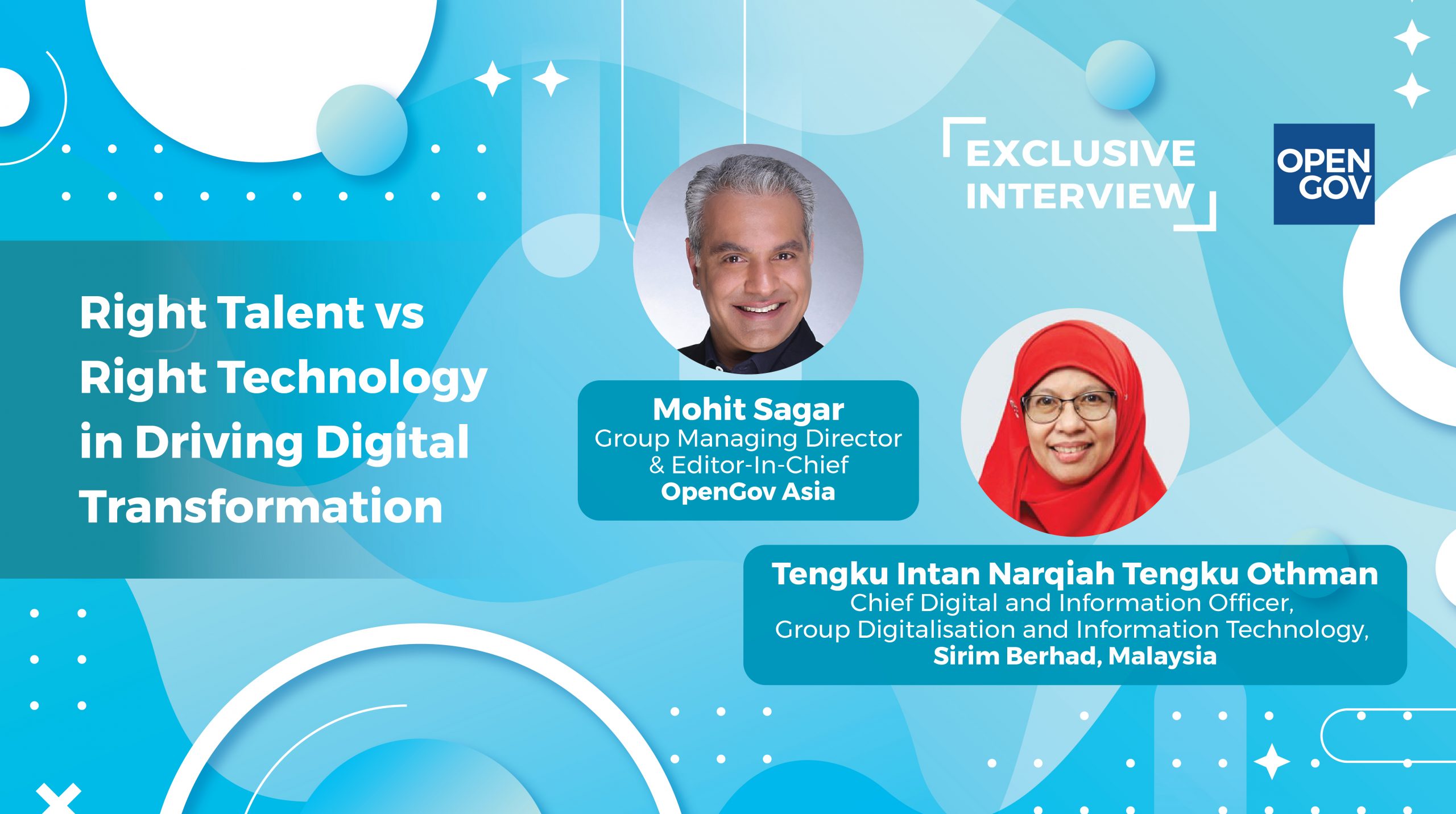
While digital fluency enables organisations to leverage intelligent technology to solve increasingly complex challenges, a gap has emerged between innovation and having the right people to drive it. Without a doubt, it is not easy to align digital tools and human resources when technology advances so quickly, creating a disparity that is prevalent at every level of the workforce and in practically every tech function.
 From entry-level personnel to experts, getting the right people, with the right skill sets at the right time is a huge challenge. With a limited pool, competitors jostle to onboard skilled, experienced talent disrupting operations and hindering progress.
From entry-level personnel to experts, getting the right people, with the right skill sets at the right time is a huge challenge. With a limited pool, competitors jostle to onboard skilled, experienced talent disrupting operations and hindering progress.
In an exclusive interview with Mohit Sagar, Group Managing Director and Editor-in-Chief, OpenGov Asia, Tengku Intan Narqiah Tengku Othman, Chief Digital and Information Officer, Group Digitalisation and Information Technology, Sirim Berhad, Malaysia shared her insights on countries struggle to have the right technology and talent in an increasingly digital landscape.
Building a digital talent strategy
Since the outbreak of the pandemic, businesses throughout Malaysia have had to deal with the economic consequences of physical separation and lockdown measures. But, if there is one key takeaway, it is that digital technology adoption is no longer optional for businesses.
Because of the host of restrictions and challenges it brought, the pandemic has accelerated the digitalisation of front-end business processes such as digital marketing and e-commerce.
“I don’t see technology adoption as a one-off project or whether there is a pre, during and post-pandemic. All through my career, whether working in a multinational company or for the government, we have always been involved in technology adoption. If there is business evolution, and there is business, I have yet to find the full stop,” Tengku Intan claims emphatically.
For digital transformation to happen, people need to learn how to use new technologies and the workforce needs to be encouraged to use their skills to make new things happen. They need to think digitally, and they need skills as well.
Employees who learn to think as digital natives do better at their jobs, are happier at work and are more likely to get promoted, she feels.
According to Tengku Intan, to attract, retain and develop digital talent in different industries, the private or public sectors need to meet employee ambition and provide them with technical challenges. Second, employers need to understand the unique talents of their employees and create avenues where they can unleash their potential. Thirdly, if employers cannot match competitive remuneration packages, they need to find ways and means to reward and motivate employees in other ways.
“I don’t think there is one formula that fits all as the culture varied from one organisation to another, and this is a journey where you cannot see the results immediately. But to drive a technology-oriented culture and digital mindset, it has to come from the top,” Tengku Intan is firmly convinced.
The digital mindset in different sectors
A digital mindset is a set of attitudes and behaviours that help people and organisations see how data, algorithms and AI open new opportunities and find ways to succeed in a business world where data-intensive and smart technologies are becoming more important.
According to her, having a pessimistic mindset is the greatest challenge in upskilling employees and imparting digital literacy across the public sector. “I cannot upskill a person who can come up with a million reasons on how not to do it. But to be fair, I cannot ask a fish to fly. As a leader, I need to really understand team members’ talent and upskill them appropriately, and not have them blindly obey orders.”
Digital transitions are often significant, involving changes in shared values, traditions, attitudes and behaviours. Starting with an activity that captures attention and conveys to everyone in the company that a new path is needed is a smart approach.
Tengku Intan says technologies like cloud computing and robotic process automation (RPA) were created to improve company processes rather than to decrease human participation or threat.
“For example, the establishment of cloud computing in SIRIM. The fact that we still retain the current team and reskill them to learn cloud management, instead of installing a physical server, shows we still need people. But tech allows us to improve tremendously on business process, where we no longer required 8 weeks to get one server up, but within 15mins,” Tengku Intan explains.
She acknowledges that knowing how to work effectively not only with people but also with machines, is an important part of collaboration in the digital age. Accepting change is the final requirement for developing a digital mindset.
SIRIM towards a new norm
SIRIM Berhad, is a Malaysian government-owned corporation, an agency under the purview of the Ministry of International Trade and Industry (MITI). It is designated as the mechanism for research and technology development, as well as the national champion of quality with over four decades of experience and knowledge.
SIRIM has always been essential in the growth of Malaysia’s private sector. Utilising its skills and knowledge base, it concentrates on developing new technologies and enhancing the manufacturing, technology and services industries.
The organisation fosters the growth of Small and Medium-Sized Businesses (SMBs) by providing solutions for technology penetration and upgrade, making them an ideal technology partner for SMBs.
“I love the fact that with the current readily available technology we can democratise the application development, data visualisation and analytics work,” Tengku Intan points out.
To drive a digital mindset, SIRIM introduced a hackathon – SIRIM Hack – where non-IT employees learned how to develop simple apps or automate their paper-based forms within 2 days. It was exciting to see some participants develop much better automation than people from an actual IT team.
SIRIM is the best partner for innovation because of its unique advantages in research and technology innovation, industry standards, and quality. They have enabled Malaysian products and services to gain international recognition for their quality and innovation.
Viewpoint: the working mum
Tengku Intan wishes to share lessons learned from her 27-year career in a variety of IT/digital and business fields with the younger generation. “I have only one mantra – Always Hack Yourself!”
She emphasises that people must continue to push themselves as only they know what motivates them. In a working environment, the younger generation should learn how to:
- be a highly effective and performing person
- be a leader and
- get their organisation always in a “healthier” state.
Male-dominated industries and occupations are especially prone to reinforcing harmful stereotypes and creating unfavourable environments that make it even more difficult for women to succeed. Despite other challenges, Tengku Intan made it to the top. “For me, so far, I have not faced any gender discrimination to be where I am today. I worked as hard and as fast as the men. My passion resonates with the energy that was released. And I continuously learn.”
Tengku Intan, however, observes some inequalities, particularly stereotyping women leaders as emotional leaders as opposed to men leaders. Those “emotional leaders” have evolved into empathetic leaders. “And it’s true, you can’t be an empathetic leader if you don’t have a lot of emotions for your people.”
Many ask Tengku Intan what her secret is to successfully balance being a wife and mother of four in a world where technology pervades almost every aspect of people’s lives. She smiles and says, “I have a very supportive and understanding husband. We share and can talk about everything.”
She agrees that this is not the case for many Malaysian working mothers, but she reminds them that it is okay if they have not excelled in their careers; if they want to be committed to being full-time mothers, they should do so.
“I have witnessed many technology women, who choose not to climb the corporate ladder but her dedication and commitment to work are second to none. They are happy to continue where they are. And I believe they are more successful than I am,” Tengku Intan happily recalls.
She is optimistic about the future for Malaysia and is wholeheartedly committed to ensuring quality and equality in Malaysia’s digital journey.
















